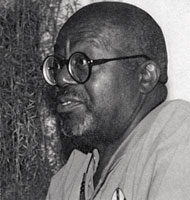Bill Hill: ‘He kept his eyes on the prize’
By
Betsey Piette
Philadelphia
Published May 12, 2005 3:40 PM
Bill Hill, a long-time activist with the Philadelphia International Action Center, died in early May of complications from a stroke suffered in February. He was 80 years old.
Hill’s life was dedicated to advancing the struggle against war, racism, ignorance, poverty and all forms of discrimination. From marches to meetings, picket lines to protests, Bill would be there, usually with his boom box to provide music, his hand-carved walking stick for support, and his seemingly boundless energy.
Hill would be found on the front lines of demonstrations demanding freedom for political prisoner Mumia Abu-Jamal. He rode countless buses to anti-war rallies in Washington and New York, where he would help staff tables, sell buttons or distribute literature. He was a tireless worker, always one of the first people to show up to help set up for an event and one of the last to leave. He walked miles putting up posters and distributing fliers for activities in solidarity with Palestine, Cuba and Iraq. He spent many years helping to raise funds by working at baseball concession stands for the All Peoples Congress.
Hill was a self-taught artist, creating jewelry, designs for buttons, posters for demonstrations, and graphics for fliers. He created walking sticks from tree limbs, adorned them with African cultural designs, and sold them to raise funds for the movement.
His special interest was the struggle against apartheid in South Africa and he devoted many years to solidarity work with the African National Congress. He was dedi cated to raising awareness among youth in his community about the African Diaspora and the diversity of African languages and cultures. He would encourage youth from his neighborhood to attend meetings, especially Black History Month events he helped to organize during the 1990s as a member of the All Peoples Congress.
Hill’s life read like a history of the anti-racist struggle in Philadelphia. He was born in Southern New Jersey, and would often speak about his mother’s uphill struggle to support him and his many siblings in a climate of racism and extreme poverty. On many occasions, rather than provide the economic support the large family needed, government officials would place the children in separate foster homes. Hill also spoke of the nightmare of being confronted by hooded Klansmen outside the family’s home, north of the Mason-Dixon Line.
While in his late teens, Hill joined the Navy during World War II. He often told how, as an African American GI, he was encouraged after the war to “just go home and make babies,” while white GIs were informed about GI benefits for education and low-interest housing loans.
Shortly after returning from the war, Hill became involved in a struggle to integrate the unions representing workers in Philadelphia’s transit system. African Americans picketing the transit company would point out the hypocrisy that, while they had risked their lives driving tanks as soldiers, they were refused jobs driving buses as civilians. During the 1960s Hill also participated in a seven-month picketing campaign led by Cecil B. Moore to force the integration of Girard College.
Hill always served as an inspiration to those much younger than he, keeping people’s spirits high with the right words at the right time, always done with eyes focused on the prize.
Articles copyright 1995-2012 Workers World.
Verbatim copying and distribution of this entire article is permitted in any medium without royalty provided this notice is preserved.
Workers World, 55 W. 17 St., NY, NY 10011
Email:
[email protected]
Subscribe
[email protected]
Support independent news
DONATE


